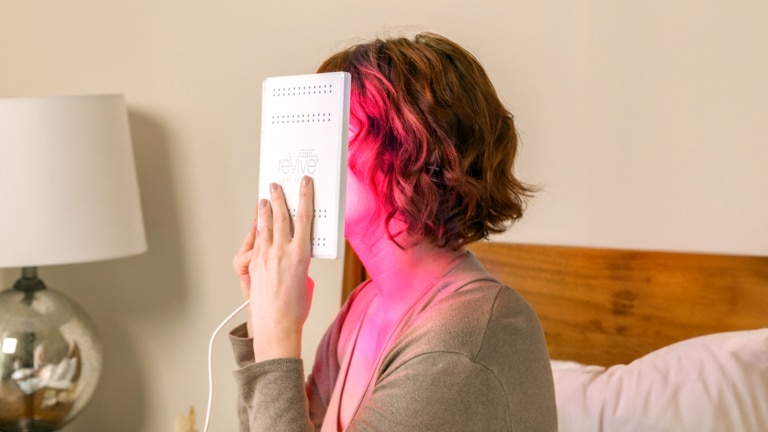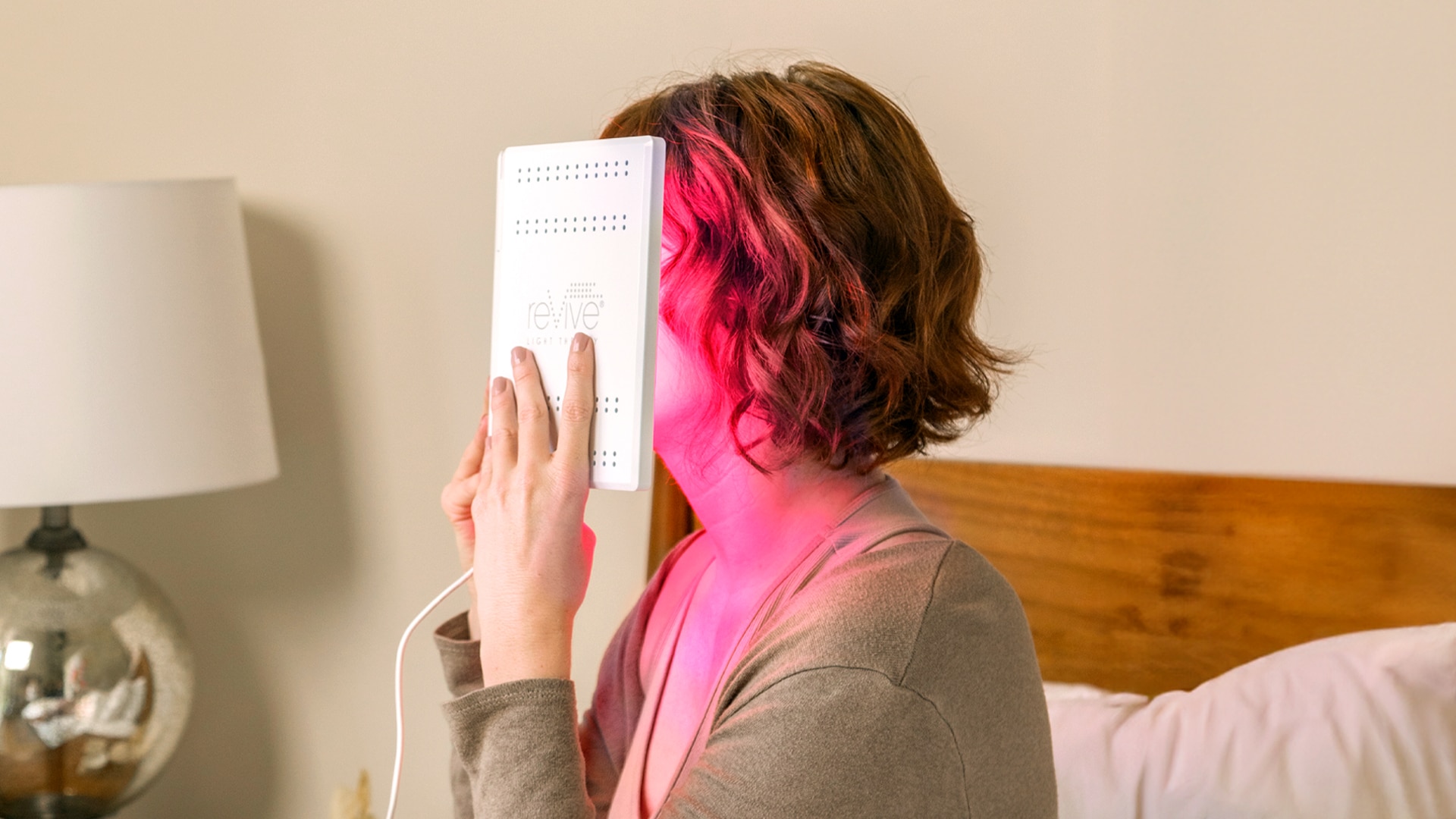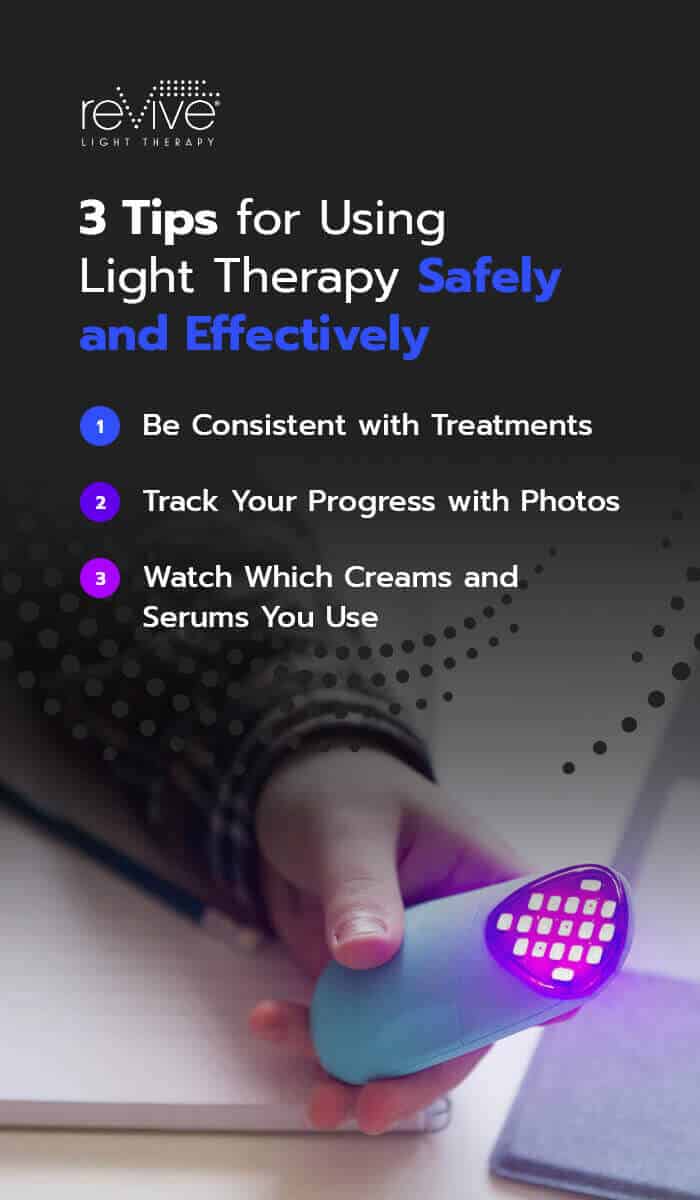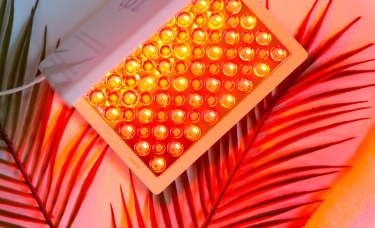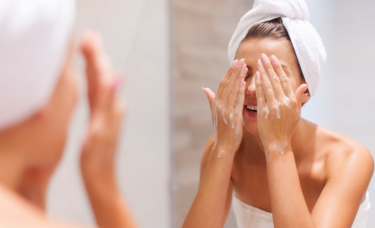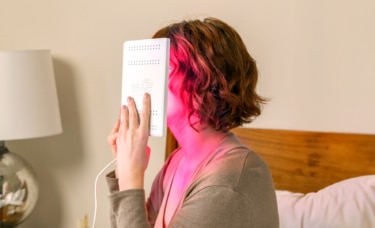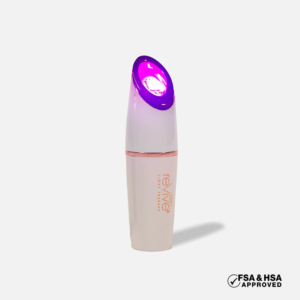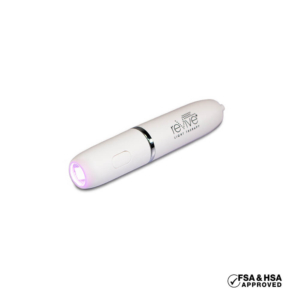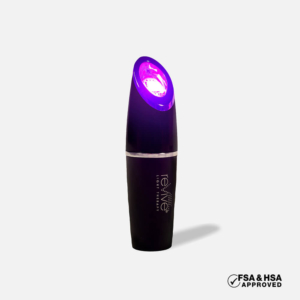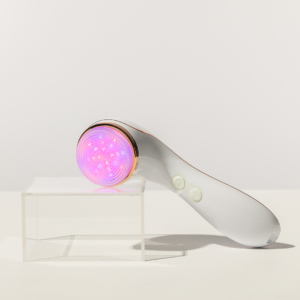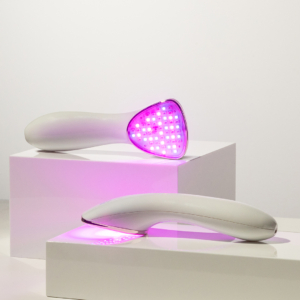Is LED Light Therapy Safe? Spoiler Alert — Yes.
You’re not alone if you think LED light therapy sounds like something from a sci-fi movie.
Don’t let the futuristic-sounding name fool you — LED lights have been around since the 1960s. However, using LED light therapy for skincare treatment is fairly new, which means there’s still a lot of mystery and intrigue surrounding it.
One of the most common questions we get about LED light therapy is, “Is LED light therapy safe to use?” Here, we cover everything you need to know about using at-home light therapy safely and effectively.
NASA originally developed the science behind LED light therapy technology to grow plants in space. Because of the regenerative properties of LEDs, it was discovered that light therapy has the potential to heal wounds naturally.
LED light therapy is a non-invasive treatment that promotes wound healing by encouraging tissue and cell growth. The lights penetrate the skin and target cells known as fibroblasts, which assist with collagen and elastin production throughout the body.
The body naturally produces collagen and elastin, two proteins that help skin tissue recover after an injury and reduce the signs of aging.
LED light therapy uses a spectrum of colors to treat various conditions. The colors often found in treatment include:
- Blue light: Blue light therapy affects the upper layer of the skin and is commonly used to treat mild to moderate acne. Blue LED light therapy helps destroy acne-causing bacteria and stabilizes oil production caused by the sebaceous glands. These devices can also potentially help with rosacea. While our devices aren’t cleared for rosacea treatment, reVive Light Therapy™ customers have reported excellent results after using our devices.
- Red light: People use red light therapy for its anti-aging benefits. Red light can help energize the cells in the skin, which helps with tissue repair, collagen production, inflammation, and cell rejuvenation. Red light therapy is best for wrinkle reduction and anti-aging treatments.
- Amber light: Amber or yellow light therapy can help reduce inflammation and boost cellular rejuvenation. Amber light can also alleviate radiation damage caused by ultraviolet (UV) rays and reduce the appearance of tiny blood vessels on the skin.
- Infrared light: Infrared light therapy has multiple applications, including relieving pain, improving circulation, boosting the immune system, decreasing diabetes side effects, and purifying the skin.
You can combine different light therapies to get the most out of your treatment and improve the health of your skin. Some people combine red and blue light therapy to treat acne because blue light destroys acne-causing bacteria and red light reduces inflammation.
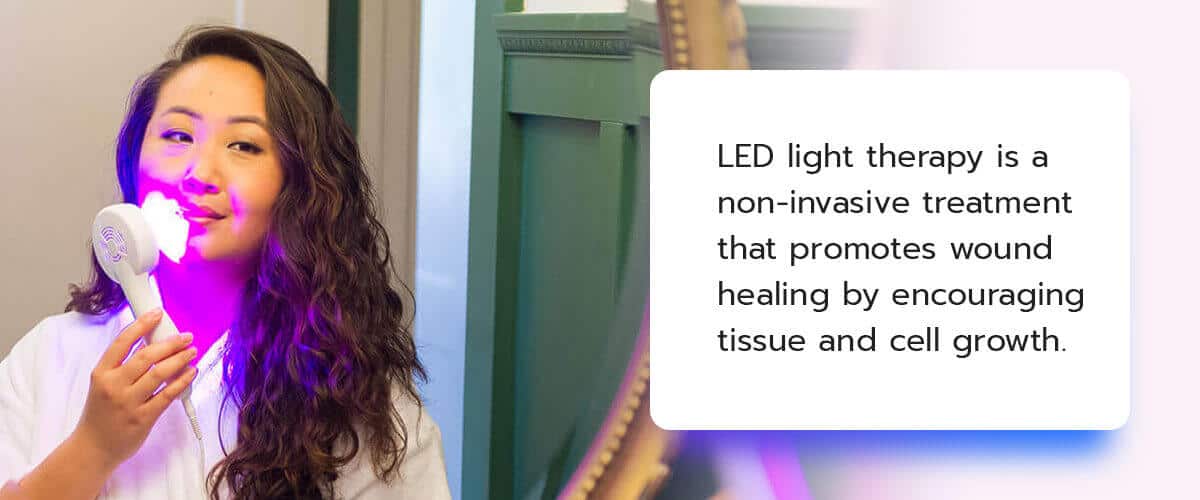
Is LED Light Therapy Effective?
Researchers have been studying the benefits of LED light therapy for decades. When people started using light therapy in the 1960s, it mainly treated chronic pain conditions. As time went on, researchers noticed how effective LED light was at treating skin conditions, and studies have confirmed its beneficial effects.
One study found that red, blue, and infrared light is effective at treating various conditions, including medical and aesthetic conditions. Participants noticed a significant improvement in their skin conditions, even those difficult to treat, such as rashes caused by chemotherapy.
Researchers have also studied specific types of LED light therapy treatment to determine the effectiveness of home devices. One study looked at how effective red light therapy was at reducing wrinkles due to aging. The study results revealed that 97.4% of participants noticed a visible change in their skin tone, wrinkles and fine lines after 10 weeks of consistent treatment.
Another study looked at how effective handheld blue light devices are in treating acne. After using the device for two weeks, 100% of participants saw a notable improvement in their existing acne, redness, and swelling. On top of treating existing acne, 90.8% of participants noted a reduction of additional breakouts.
The research speaks for itself, showing that LED light therapy effectively treats various skin problems. Using home LED devices can provide as many benefits as professional dermatology treatment.
Is LED Light Therapy Safe for the Skin?
If you’re using an FDA-cleared device, LED light therapy is safe for the skin. Since we all know it’s important to limit sun exposure for healthy skin, it can be confusing to understand how LED light therapy actually helps your skin. Here are some critical facts about LED light therapy safety:
- LED light therapy devices do not emit harmful ultraviolet rays.
- Unlike chemical peels, dermabrasion, and laser therapy, LED light therapy has no recovery or downtime.
- LED light therapy is safe for all skin types and skin tones.
- LED light therapy is known to aid in wound healing, acne treatment, sunburn prevention, and skin rejuvenation — which makes light therapy a safe solution for regular use at home.
While LED light therapy poses no harm to the skin for most people, it’s essential to protect your eyes during treatment. If you treat an area close to the eyes, you should use protective goggles.
Is LED Light Therapy Safe When Pregnant?
If pregnant, consult with your doctor prior to using the light therapy.
Is LED Light Therapy Safe for Dark Skin?
Unlike cosmetic treatments like laser hair removal, which can be limited due to the pigmentation of one’s skin, you can reap the same benefits from light therapy as anyone else. You can even use LED light therapy if you have sensitive skin, as it doesn’t burn you like laser treatments can.
Is LED Light Therapy Safe for Rosacea?
Our light therapy devices are not cleared for rosacea. However, many of our customers with rosacea have reported a significant improvement with their skin while using our devices.
What Are the Side Effects of LED Light Therapy?
LED light therapy is a safe and non-invasive procedure, and when you’re using a home LED device, the only thing you have to worry about generally is protecting your eyes. But if you choose to seek treatment at a dermatology office, you could experience some rare side effects.
A professional treatment usually starts with a photosensitizer, a topical medication that can make your skin more sensitive to treatment. Some people might experience pain in the targeted areas during a professional LED light facial treatment. Once treatment is complete, a person might have a photosensitive reaction, which results in the following side effects:
- Redness
- Stinging or burning sensation
- Peeling
- Temporary acne flare-ups
- Temporary hyperpigmentation
- Hives or eczema
Some of these reactions are due to the topical cream applied before treatment starts. While these side effects can be uncomfortable, they’ll fade within a couple of days and should clear up completely within three weeks.
Many people prefer to avoid the side effects altogether by using a home LED device instead of seeking dermatologist treatment. People can experience the same benefits from at-home therapies as they would from a professional LED light treatment.
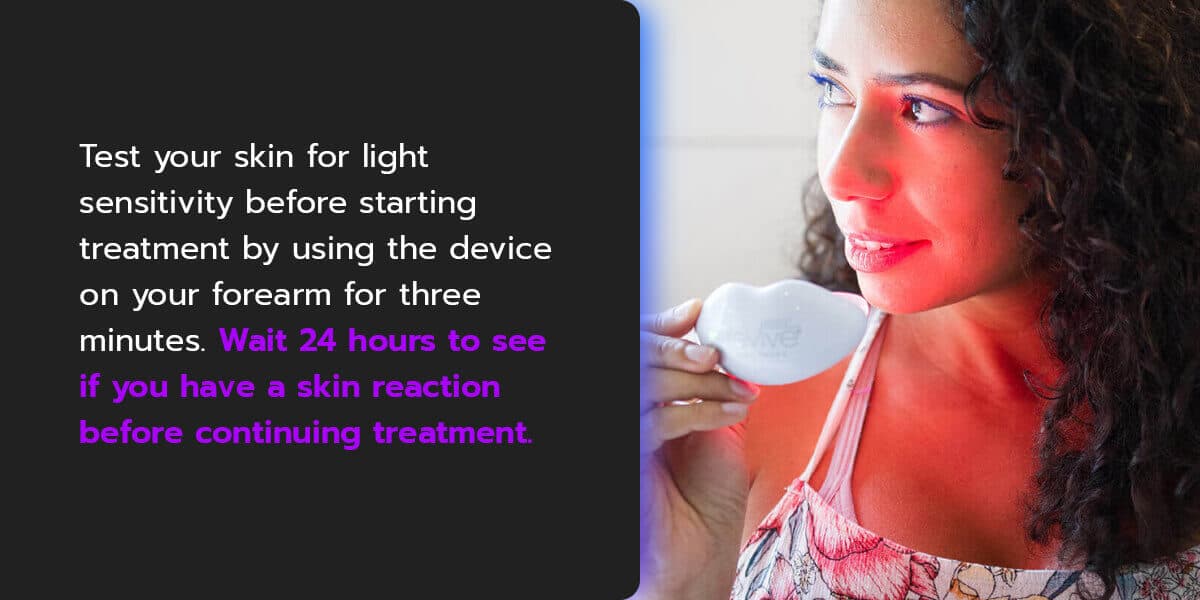
Can You Use LED Light Therapy Too Much?
We’re often told that less is more when it comes to skincare because if you over wash or over-exfoliate, you end up stripping your skin of natural oils, which can cause dryness or acne breakouts. Since light therapy works from the inside out to stimulate cellular regeneration and increase blood circulation.
Since LED lights contain no ultraviolet light, you won’t damage your skin while using the device. Using your light therapy device as a part of your daily skincare routine — once in the morning and once at night — might be most effective, as it’s recommended to stick with three treatments per area per day. We recommend only three treatments because your cells can only absorb so much light energy. Doing more than three treatments doesn’t add benefits to your skin. While you won’t experience harmful effects from more than three treatments, you won’t see further progress, either.
However, the order of your skincare routine is an essential factor in maximizing the effectiveness of all your skincare products, including LED light therapy.
It’s essential to follow the manufacturer’s instructions to get the best results. Most home devices recommend that you treat one area for three to 10 minutes, depending on the type of treatment. You can move on to another location and repeat the process.
Test your skin for light sensitivity before starting treatment by using the device on your forearm for three minutes. Wait about three minutes after the test and check if the area has turned red. If the area has turned red and lasts for more than two hours, your skin is likely light-sensitive. If this reaction occurs, discontinue the use of the product and contact customer service.
Who Should Not Use Light Therapy?
Most people can safely use LED light therapy treatments, but a few individuals may experience more severe side effects. You shouldn’t use light therapy if:
- You’re currently using Accutane to treat your acne – you should not combine light therapy with Accutane
- You’re using a skincare product that makes your skin more sensitive to sunlight
- You’re taking a medication that makes you more sensitive to light
- You have an active rash
- You have a history of skin cancer or eye diseases
- You have a history of photosensitivity reactions
While a few individuals shouldn’t use light therapy, LED light treatment is generally safe for the vast majority of people.
3 Tips for Using Light Therapy Safely and Effectively
Like any part of your skincare regimen, you can take steps to make the most of your LED light therapy. The recommended time per treatment session is typically three minutes, although specific instructions will be provided within the product’s packaging. Some LED skincare tools come with an automatic timer to make treatment even more effortless. Here are four tips for using light therapy safely and effectively.
1. Be Consistent with Treatments
Consistency is key when treating acne, reducing wrinkles, or tackling just about any skin concern. While it’s perfectly fine and safe to perform up to three light therapy sessions within a day, consistent long-term use trumps sporadic periods of intense use. It’s easy to use a skincare tool when you first buy it and then slowly drop off in use However, regularly using your light therapy device is key to seeing improvements.
To see the best results, we recommend using light therapy three times a day for a few weeks. According to the American Academy of Dermatology, most people see results from light therapy after a series of treatments and regular use over time. Once you’ve developed that level of consistency, you can begin to reduce treatment sessions as you see your desired results.
2. Track Your Progress with Photos
Who doesn’t love a good “before and after” photo? We strongly suggest taking pictures of your acne or wrinkles to see your progress. Take pictures on day one, then after week one, week two, and so on. Take all photos in the exact location, at the same time of day with the same lighting camera. Consistency matters when comparing before and after pictures.
Even though light therapy works rather quickly, it is still a gradual process, just like any other skincare or lifestyle change. You might not notice the small changes that occur daily, so it’s great to have pictures to see the difference that light therapy can truly make. In addition, taking photos helps keep an eye on unexpected changes in your skin, so it is also an excellent safety precaution.
3. Watch Which Creams and Serums You Use
For the most part, skincare products like vitamin C serums and moisturizers are fine to use with light therapy. However, if you are using a skincare product containing retinol, you will want to be cautious about how you combine them.
Retinol increases the skin’s sensitivity to light and, dermatologists recommend avoiding sun and light exposure after applying retinol. While retinol can be used with light therapy, it is recommended to apply retinoids after light therapy.
LED Light Therapy — A Natural Part of Your Skincare Routine
LED light therapy can be a fundamental part of your skincare routine, no matter your beauty goals. At reVive Light Therapy™, we love helping you find the right products to own your skin goals and feel confident in your skin.
All of our products are FDA-cleared. You can find products with a full spectrum of light if you’re looking to benefit from light therapy in multiple ways. We pride ourselves on helping our customers find innovative and flexible solutions to their skincare needs.
If you seek a natural, effective treatment for wrinkles, acne, or other skincare conditions, make sure to explore our full selection of LED products.
Frequently Asked Questions
Which wavelengths are used in light therapy?
- Health and wellness light therapy devices use LEDs that emit light in the blue, amber, red, or infrared range of the light spectrum. Energy wavelengths are shorter toward the blue end of the spectrum and longer toward the infrared end of the spectrum. The human eye can see light from about 380 nm (at the blue end) to about 750 nm (at the red end). The infrared waves can penetrate deeply to relieve muscle and joint pain. Blue light works closer to the skin’s surface. Read more about the science of light therapy in this blog article!
Why is FDA clearance important for at-home light therapy skincare devices?
- Safety should be your top priority with any skincare products you purchase, and this extends to light therapy devices. Light therapy devices need to have FDA clearance in the United States. The FDA has not reviewed devices without clearance for potential safety concerns. At LED Technologies, Inc., all of our LED light therapy products are FDA-cleared. You can feel confident in our commitment to your safety.
What skincare products can you use with light therapy?
- Use LED light therapy products on a clean face. You can use creams with ingredients like salicylic acid and other beta hydroxy acids (BHAs) alongside your light therapy devices. After light therapy treatment, retinol or vitamin C serums can be applied. Find more details on the types of skincare products used with light therapy here.
Do reVive Light Therapy™ or dpl® devices have EMF output?
- All of LED Technologies, Inc. devices have been tested to medical device standards for any type of output, EMF (electromagnetic field) or otherwise, and are safe to use. Our device LEDs do not emit UV (ultraviolet) rays, so there is no risk of harm from these wavelengths.
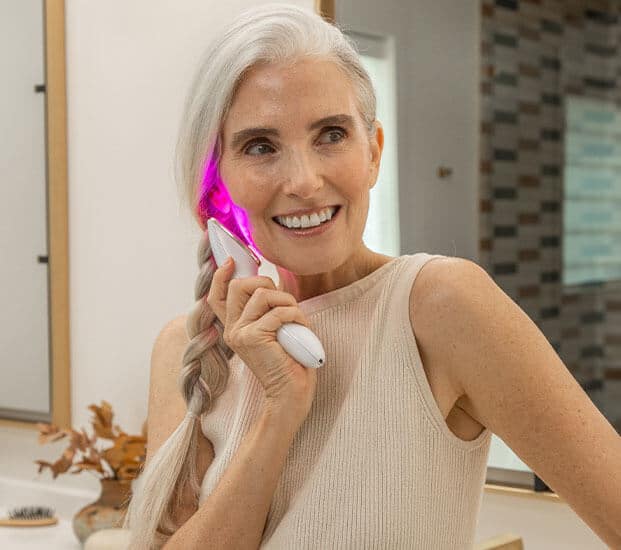
Experience the power of light therapy at home
Specific wavelengths of light have different effects, and can be used for a variety of applications — from destroying acne-causing bacteria to killing harmful germs on your phone. Our light therapy devices allow you to harness the power of LEDs in the comfort of your own home.
See How It Works